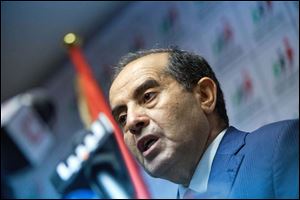
Libyan election results hint at blow to Islamists
Liberal factions in lead in early counting
7/9/2012
Mahmoud Jibril speaks to the media during a press conference Sunday at National Forces Allies head quarter in Tripoli, Libya. Libya's first nationwide elections in nearly five decades brought hints Sunday of an Arab Spring precedent: Western-leaning parties making strides over Islamist rivals hoping to follow the same paths to power as in neighbors Egypt and Tunisia. A liberal alliance led the former rebel prime minister Mahmoud Jibril appeared to hold more than half the seats in the capital Tripoli and the revolution stronghold of Benghazi, according to several party representatives.
TRIPOLI, Libya -- A coalition led by a Western-educated political scientist appeared Sunday to be leading Islamist parties in Libya's first election in the post-Gadhafi era.
Libyans, many casting their ballot with tears in their eyes, hailed Saturday's poll as a chance at a brighter future for their North African country.
Although two deaths were reported as anti-election protesters sought to disrupt the vote, the mood was jubilant.
Even in Moammar Gadhafi's hometown of Sirte, which experienced some of the worst fighting in last year's uprising to end his 42-year rule, there was relief that the vote had gone smoothly.
RELATED STORY: Parliament called back in Egypt
"Allahu akbar [God is great], this is the freedom era -- for the first time Sirte is free," chanted a local woman as she celebrated with her family.
A total of 1.7 million of some 2.8 million registered voters had cast their ballots.
Final results from Saturday's parliamentary election could be days away, but unofficial and partial counts from Libya's biggest cities suggested liberal factions were leading the Muslim Brotherhood and its allies.
The 200-seat parliament will face the task of forming a government -- which could become tests of strength for Islamists and secular forces over questions such as women's rights, the extent of traditional Islamic law, and relations with the United States and other Western nations that helped bring down Gadhafi.
In Washington, President Obama congratulated Lib- yans on the vote, calling it "another milestone on their extraordinary transition to democracy."
U.N. Secretary-General Ban Ki-moon praised the people of Libya and the candidates who "contested the election in a peaceful, democratic spirit," according to his spokesman.
The ballots must be portioned out according to two categories: Eighty seats are set aside for party lists and the remaining 120 are for individual independent candidates. In the first group, a liberal alliance led by the former rebel Prime Minister Mahmoud Jibril appeared to hold more than half the seats in the capital Tripoli and the revolution stronghold of Benghazi, according to several party representatives.
In western Libya, where Mr. Jibril's tribe, the Warfalla, is prominent, his party also was on the top in the early counting, the political officials said.
Faisal Krekshi, secretary general of Mr. Jibril's Alliance of National Forces, said the results were based on reports by party representatives at counting centers across the nation of 6 million people.
Even officials from rival Islamist parties -- the Muslim Brotherhood's Justice and Construction Party and the Islamist Al-Watan -- described Mr. Jibril's alliance as the biggest winner in the race for the 80 party seats.
The other 120 seats will be decided by the results from the head-to-head races among thousands of candidates, making the outcome nearly impossible to predict.
"We are all waiting and we have nothing to suggest that one party is ahead of others," Nouri al-Abar, the election commission chief, said.
He refused to set a date for announcing complete results.
Some observers believe it could take nearly a week.
Mr. Jibril vowed to "commit ourselves to what the commission will announce officially" and urged for all political factions to work toward "national consensus."